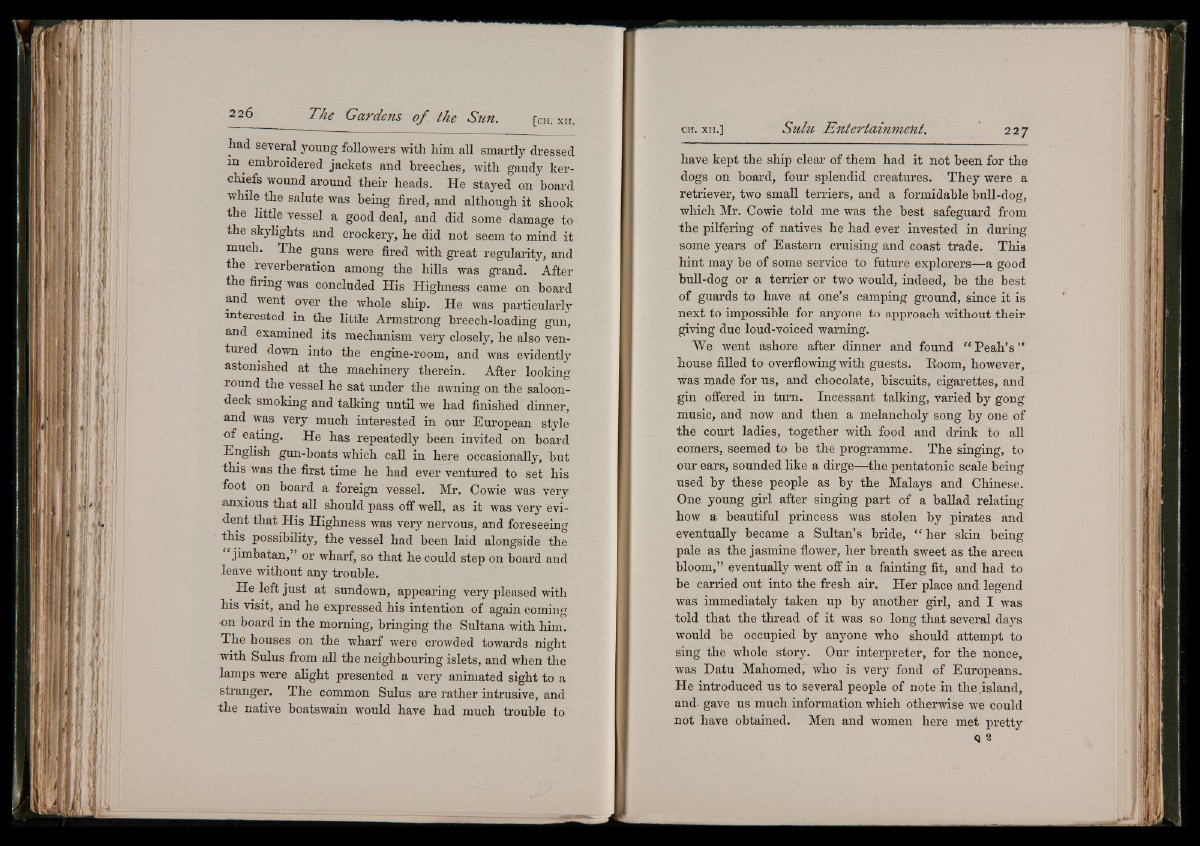
had several young followers with him all smartly dressed
in embroidered jackets and breeches, with gaudy kerchiefs
wound around their heads. He stayed on board
while the salute was being fired, and although it shook
the little vessel a good deal, and did some damage to
the skylights and crockery, he did not seem to mind it
much. The guns were fired with great regularity, and
the reverberation among the hills was grand. After
the firing was concluded His Highness came on board
and went over the whole ship. He was particularly
interested in the little Armstrong breech-loading gun,
and examined its mechanism very closely, he also ventured^
down into the engine-room, and was evidently
astonished at the machinery therein. After looking
round the vessel he sat under the awning on the saloon-
fteck smoking and talking until we had finished dinner,
and was very much interested in our European style
of eating. He has repeatedly been invited on board
English gun-boats which call in here occasionally, but
this was the first time he had ever ventured to set his
foot on board a foreign vessel. Mr. Cowie was very
anxious that all should pass off well, as it was very evident
that His Highness was very nervous, and foreseeing
this possibility, the vessel had been laid alongside the
jimbatan,” or wharf, so that he could step on board and
leave without any trouble.
He left just at sundown, appearing very pleased with
his visit, and he expressed his intention of again coming
•on board in the morning, bringing the Sultana with him.
The houses on the wharf were crowded towards night
with Sulus from all the neighbouring islets, and when the
lamps were alight presented a very animated sight to a
stranger. The common Sulus are rather intrusive, and
the native boatswain would have had much trouble to
have kept the ship clear of them had it not been for the
dogs on board, four splendid creatures. They were a
retriever, two small terriers, and a formidable bull-dog,
which Mr. Cowie told me was the best safeguard from
the pilfering of natives he had ever invested in during
some years of Eastern cruising and coast trade. This
hint may be of some service to future explorers—a good
bull-dog or a terrier or two would, indeed, be the best
of guards to have at one’s camping ground, since it is
next to impossible for anyone to approach without their
giving due loud-voiced warning.
We went ashore after dinner and found “ Peah’s ”
house filled to overflowing with guests. Eoom, however,
was made for us, and chocolate, biscuits, cigarettes, and
gin offered in turn. Incessant talking, varied by gong
music, and now and then a melancholy song by one of
the court ladies, together with food and drink to all
comers, seemed to be the programme. The singing, to
our ears, sounded like a dirge—the pentatonic scale being
used by these people as by the Malays and Chinese.
One young girl after singing part of a ballad relating
how a beautiful princess was stolen by pirates and
eventually became a Sultan’s bride, “ her skin being
pale as the jasmine flower, her breath sweet as the areca
bloom,” eventually went off in a fainting fit, and had to
be carried out into the fresh air. Her place and legend
was immediately taken up by another girl, and I was
told that the thread of it was so long that several days
would be occupied by anyone who should attempt to
sing the whole story. Our interpreter, for the nonce,
was Datu Mahomed, who is very fond of Europeans.
He introduced us to several people of note in the island,
and gave us much information which otherwise we could
not have obtained. Men and women here met pretty